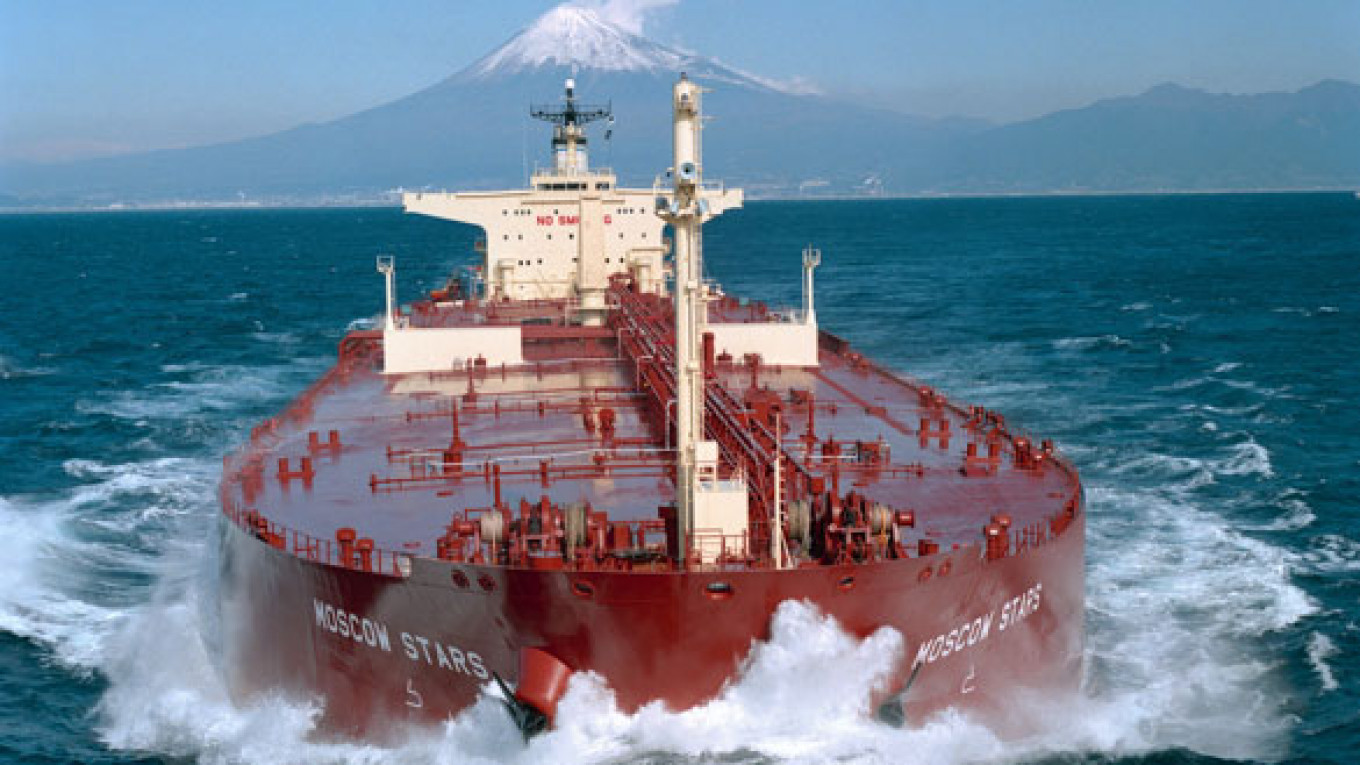A Russian warship was headed toward a Russian-operated oil tanker hijacked by Somali pirates off the coast of Yemen late Wednesday.
Somali pirates hijacked the tanker Moscow University with 23 Russian sailors about 350 nautical miles from Socotra, Yemen, earlier in the day, in the first ever seizure of a Russian ship with a Russian crew.
The tanker is operated by state-controlled Novoship, a Novorossiisk-based company that is part of Sovcomflot.
Communication with the tanker ceased at 8 a.m. Moscow time, when the captain radioed that two boats carrying gunmen had opened fire, Novoship said.
The captain alerted military ships in the area, and the Russian warship Marshal Shaposhnikov was headed toward the tanker late Wednesday.
The warship was expected to reach the area by 11 p.m. Moscow time, depending on weather conditions, a Navy source told Interfax.
What action it might take next was unclear.
Maritime experts said negotiations and a ransom payment would be the best strategy because storming a tanker full of oil might have tragic consequences.
"It would be dangerous for the crew and for the tanker itself," said Mikhail Voitenko, editor of the Maritime Bulletin.
He said the warship was unlikely to intervene unless the tanker crew members managed to hold out in a hard-to-access room.
The crew members have locked themselves in the radar room, Jan Thornqvist, an admiral with the European Union's Navfor naval force, told reporters in Kenya.
The pirates warned against any rescue attempt and said the tanker was headed for the Somali coast. "Any attempt to rescue the ship will certainly endanger the crew. The ship will be docked at Garacad," a pirate called Abdi told Reuters.
The cargo of crude oil is valued at $52 million and belongs to Unipec, an oil trader affiliate of China's Sinopec, Reuters reported. It was picked up in Sudan and was being carried to China when the Liberian-flagged ship was hijacked.
Novoship said the tanker has a dead weight of 106,000 tons and was carrying 86,000 tons of crude.
The tanker last docked in Russia in February, at the Far East port of Vostochny, a Novorossiisk port source told Interfax. It also participated in the launch of the East Siberia-Pacific Ocean pipeline last December when Prime Minister Vladimir Putin pushed a button to fill it with Rosneft oil from the pipeline. ?
Novoship said it had alerted the relatives of the 23 sailors but had no comment on any rescue efforts or ransom because no demands had been made. A company source told Interfax that the ship was insured against piracy attacks.
Russia's envoy to NATO, Dmitry Rogozin, said the situation was "in the hands of the Russian Navy." The tanker was hijacked in a "safe zone" to which it had been accompanied by the Russian warship. "This signifies that the pirates have expanded their zone of activity to areas previously considered safe," he said.
Last month, three Thai fishing vessels were hijacked as far as 1,900 kilometers off the Somali coast, "the furthest east of any pirate attacks in the area … and almost 600 miles outside the normal EU Navfor operating area," the EU's Navfor Operation Atalanta, which was launched against the pirates in 2008, said in a statement.
Moscow University's crew of 23 Russians puts the total number of Russians being held by pirates at 26 because three Russians are among the crew of the St. James Park, a British tanker captured on Jan. 28, Voitenko said.
He said it would be better for Russian government agencies to stay out of the Moscow University affair and let Sovcomflot handle negotiations, "either directly or through a mediator."
"The pirates may use the fact that the crew and the ship belong to the same country … and try to get more money," he said by e-mail. ?
Last month, Russia's UN ambassador, Vitaly Churkin, introduced an initiative to the UN Security Council aimed at ensuring that captured Somali pirates do not escape punishment.
President Dmitry Medvedev lobbied for an international court that would prosecute pirates last May.
Medvedev spoke after pirates held a Ukrainian ship with three Russian and 17 Ukrainian sailors and a cargo of tanks for three months. The pirates initially demanded a ransom of $35 million but later accepted $3.2 million from Ukrainian billionaire Viktor Pinchuk.
Novoship manages a fleet of 56 ships with a combined deadweight of 4.65 million tons, worth about $3.19 billion. In 2007, it came under the control of the Sovcomflot group, Russia's largest and 100 percent state-owned shipping company. Kremlin chief of staff Sergei Naryshkin heads its board of directors.
A Sovcomflot stake of 25 percent minus one share is on the list of 28 strategic state assets that may be offered for sale as part of a privatization drive announced last year.
In 2009, another Novoship vessel, an Aframax-class oil tanker carrying fuel oil, fought off armed hijackers in the Gulf of Aden by hosing the three pirate boats down with water.


